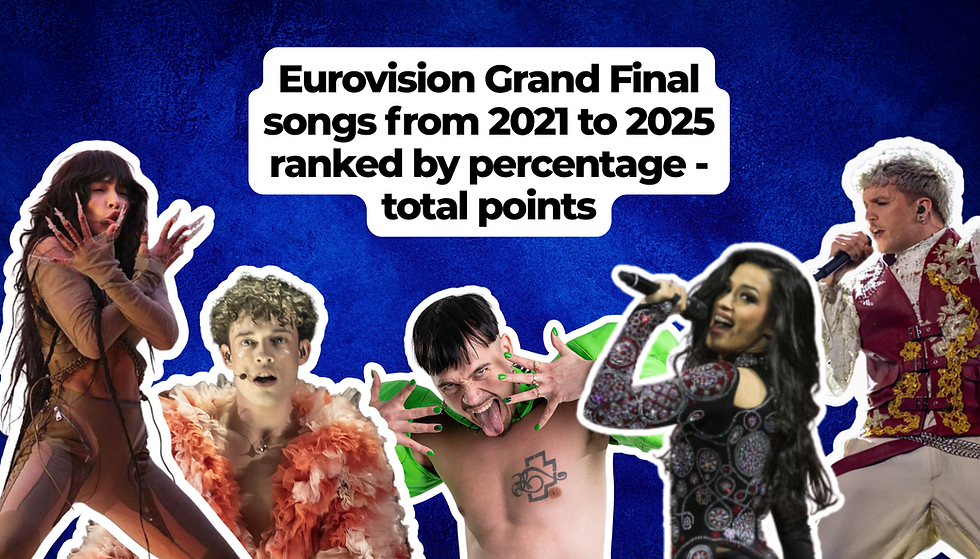Eurovision Fan Survey 2023: Who is the average fan?
- Dale Roberts

- Jun 15, 2023
- 4 min read
Updated: Jun 16, 2023

Our fifth annual survey of Eurovision fans across the globe has been completed for another year.
We have crunched the numbers and over a series of articles we'll look at who makes up the fandom, what their views are on the Contest and how Aussie and other Eurofans differ.
This year we received 424 responses from fans in 33 countries with the most "typical" fan being:
Male
In some form of a relationship
35-44
LGBTIQ+
This is a bit of a change from last year's survey, with the most common relationship status changing from single to relationships and the age bracket moving from 25-34 to 35-44.
But, of course, there is much more to the Eurovision fandom than those top level results.
Let's take a look at the results more closely:
Where were they from?
Being an Australia-based fan site, it's no surprise to see Australia high in the responses.
The total responses by region were:
Australia - 227
Europe - 146
Rest of the World - 44
The countries with the most participants outside Australia were:
United Kingdom - 67
Philippines - 21
Ireland - 13
Netherlands - 10
USA - 10
Greece - 8
Germany - 7
Sweden - 6
Denmark - 5
France - 5
Canada - 5
Although English language countries were clustered at the top, 65 participants came from European countries other than the UK and Ireland.
Demographics
Respondents were generally older (58% were over 35), male (57%), in some form of relationship (55%) and from the LGBTIQ+ community (60%).
This closely aligns with our last survey but there have been some notable changes:
Female respondents increased again and now sit at 41% (previous surveys have been 37%, 35% and 32%)
Those respondents who are single dropped from 50% to 45%
Those identifying as heterosexual increased from 37% to 40%
People identifying as bisexual increased from 12% to 18%
25-34 year olds dropped from 26% to 22%
Many of these changes may not be a change in the make-up of the Eurovision fandom, but a change of distribution in responses from fans to our survey.
Full Demographic Results
Age

Under 18 – 4%
18-24 – 16%
25-34 – 22%
35-44 – 24%
45-54 – 22%
55+ – 12%
Gender
Male – 57%
Female – 41%
Non-binary – 2%
Relationship status
Single – 45%
Married – 26%
Partnered/Defacto – 16%
In a relationship – 13%
Other (including widowed) – 0.5%
Sexual Orientation
Heterosexual – 40%
Gay – 38%
Bisexual – 18%
Lesbian – 3%
Other – 2%
So we know who they are, but what are they interested in?
We asked Eurovision fans to rate their interest in certain topics from 'very interested' down to 'no interest'.
In terms of ‘very interested’ these topics were highest among fans:

Pop music overtakes travel as the number one interest of Eurovision fans. Both had the same amount of "very interested" but pop music had more "interested" votes to jump in front.
Pop music rises one percentage point to 45% while travel drops six percentage points from 51% last year.
Geography climbs up from 5th to 3rd, quizzes remain in 4th place while languages drops from 3rd to 5th.
Reading rises from 27% to 32% while Olympics remains the highest interest sporting related topic, with 21%.
The full list is below (% is "very interested" in this topic):
Pop music - 45%
Travel - 45%
Geography - 37%
Quizzes - 36%
Languages - 33%
History - 33%
Reading - 32%
Film - 30%
Politics - 28%
Olympics - 21%
Gaming -112%
Football - 9%
Tennis - 9%
Reality TV - 9%
AFL - 8%
Athletics - 7%
Motor racing - 7%
Rugby league 3%
Rugby union - 3%%
Basketball - 1%%
How did fans get into the contest?
We asked fans how they were introduced to the contest and in a change from last year, general promotion was first with 38% of fans discovering Eurovision this way.

Parents were next, dropping from 36% to 34% with all family members combined making up 40% of respondents.
Friends (11%), partner (3%) and because of the artist competing (7%) were the other top sources.
General promotion – 38%
Parents – 34%
Friends – 11%
Artist competing – 7%
Other family – 4%
Partner – 3%
Grandparents – 2%
Teacher – 1%
When did fans get into the contest?
We asked fans which year they considered themselves becoming a "fan".
Breaking this down into each decade, it was no surprise to see the recent 2010s come out on top.

2020s – 7%
2010s – 36%
2000s – 24%
1990s – 16%
1980s – 10%
1970s – 5%
1960s – 2%
When looking at the individual years this is how they track over time:

The most popular years were:
2014 – 26
2009 – 20
2012 – 17
2013 – 17
2016 – 16
2015 – 15
2018 – 15
2008 – 14
2017 – 14
2019 – 14
The most popular years from the 20th century were:
1990 – 13
1996 – 10
1986 – 7
1987 – 7
1993 – 7
1995 – 7
1998 – 7
1999 – 7
How many times have fans been to Eurovision?
66% of fans have yet to go to Eurovision with another 17% attending on one occasion.
These are exactly the same numbers as the 2022 fan survey.
17% of fans have been at least two times, while a lucky 4% have gone five times or more.

So this is our first snapshot on who fans are, what their interests are and how they got into the contest.
Throughout this week we'll be revealing more from the Eurovision fan survey including regional differences between fans plus views on:
Jury versus televote scoring
Rule changes
Which countries should be let in or come back
Whether Australia should stay
Which Eurovision contest is the best
And much, much more!
To keep up with these results follow us on Facebook, Twitter and Instagram. All links at: https://linktr.ee/aussievisionnet



google 优化…
무료카지노 무료카지노;
Fortune Tiger…
Fortune Tiger…
Fortune Tiger…
Fortune Tiger…
gamesimes gamesimes;
站群/ 站群
03topgame 03topgame
betwin betwin;
777 777;
slots slots;
Fortune Tiger…
谷歌seo优化 谷歌SEO优化+外链发布+权重提升;
google 优化 seo技术+jingcheng-seo.com+秒收录;
Fortune Tiger Fortune Tiger;
Fortune Tiger Fortune Tiger;
Fortune Tiger Fortune Tiger;
Fortune Tiger Slots Fortune…
站群/ 站群
gamesimes gamesimes;
03topgame 03topgame
EPS Machine EPS Cutting…
EPS Machine EPS and…
EPP Machine EPP Shape…
Fortune Tiger Fortune Tiger;
EPS Machine EPS and…
betwin betwin;
777 777;
slots slots;
Fortune Tiger Fortune Tiger;
google seo…
03topgame 03topgame;
gamesimes gamesimes;
Fortune Tiger…
Fortune Tiger…
Fortune Tiger…
EPS Machine…
EPS Machine…
seo seo;
betwin betwin;
777 777;
slots slots;
Fortune Tiger…
seo优化 SEO优化;
bet bet;
google seo…
Fortune Tiger…
Fortune Tiger…
Fortune Tiger…
Android Android
software software
Q&A Q&A
Notícias Notícias
sitemap sitemap;
sitemap sitemap;
谷歌seo优化 谷歌SEO优化;
Fortune Tiger Fortune Tiger;
Fortune Tiger Fortune Tiger;
Fortune Tiger Slots Fortune Tiger Slots;
Fortune Tiger Fortune Tiger;
Fortune Tiger Fortune Tiger;
Fortune Tiger Slots Fortune Tiger Slots;